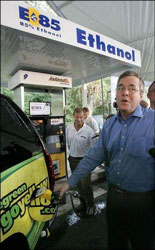 Two more prodcers became BQ-9000 this week, according to the National Biodiesel Board.
Two more prodcers became BQ-9000 this week, according to the National Biodiesel Board.
Although new to biodiesel production in the United States, Cargill took measures while constructing its biodiesel facilities so that it could help ensure it meets the industry standard for quality. Cargill’s Iowa Falls, Iowa, location has produced biodiesel since May. The company reports 37.5 million gallons of capacity. 
Griffin Industries of Kentucky, an early producer of biodiesel beginning in the late 1990s, has also achieved BQ-9000 accreditation. “Our ability to further validate the consistent quality of Griffin’s BioG-3000® premium biodiesel is a critical step to maintaining and building consumer confidence,” said Tom Griffin, Senior Vice President for Griffin Industries.
BQ-9000 is a voluntary fuel quality assurance program that includes procedures for fuel storage, handling and management aimed at ensuring biodiesel fuel quality throughout the distribution system. To date, 11 companies are BQ-9000 accredited, with another seven undergoing the process.


 Oklahoma Governor Brad Henry is holding a conference on biofuels next month in Norman, Okla.
Oklahoma Governor Brad Henry is holding a conference on biofuels next month in Norman, Okla.  Geez, guys, can’t we all just get along?
Geez, guys, can’t we all just get along?

 Despite a dry summer in many parts of the country, there’s still plenty of corn to go around.
Despite a dry summer in many parts of the country, there’s still plenty of corn to go around. E85 has arrived in the Sunshine State.
E85 has arrived in the Sunshine State.
 A study released today by the
A study released today by the  Everton Energy, a new biofuel company headquartered in Kansas, has announced the appointment of Bert Farrish as the company’s first Chief Executive Officer.
Everton Energy, a new biofuel company headquartered in Kansas, has announced the appointment of Bert Farrish as the company’s first Chief Executive Officer. 
 Officials with California-based
Officials with California-based  According to this
According to this